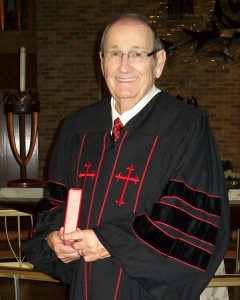
I was talking with a friend the other day and she said a very important thing. We were talking about the misery in the world today, and she said, “ Every day, I try to do something that brings a little joy into my own life as well as doing something nice for someone else.” If that’s not a formula for happiness, I don’t know what is. Have you done something completely unselfish lately?
***
Do you ever feel that you are more than one person? That is, you have many parts to your personality that makes you come across as more than one individual? Like Dietrich Bonhoeffer once said, “Who am I, this or the other? Am I one person today and tomorrow another?”
Psychologists tell us that if we are under enough pressure, we can be several different people; as many as 20 or more personalities. We may hear this remarks: “I don’t know what got into me when I said that,” or “She is the last person I thought would do that,” or “That doesn’t sound like him.” Before I wade in deeper waters than I can swim in, let’s go to the New Testament to an experience Jesus had. “Please don’t torment me,” said the poor guy who had been living among the tombs. Mark 4 illustrates that multiple personalities have existed in people along time, and shows how people can be “beside themselves”. Jesus called it “unclean spirits”, which is a basket term for all kinds of diseases. The poor guy said, “My name is legion,” meaning there are lots of us.
The Apostle Paul had many sides to his personality. After his life-changing experience—he had persecuted Christians at one time—on the way to Damascus, he felt he had it made. Then, a “thorn in the flesh” caused him to say, “The good I want to do, I don’t do, and the evil I don’t want to do is what I do” (Romans 7:15ff).
Multiple personality disorders date back to ancient forms of demonic possession. A lot of “unclean spirits” begin in childhood. An abused child will dissociate the painful memories and repress negative feelings, and stuff these painful memories throughout adulthood. This is where the Gospel comes in. We need to bring these fragmented selves under one umbrella, and open ourselves to the Christ-Spirit. This can work wonders. It means being completely honest with yourself. It means complete surrender to the Christ-way. It’s the way of peace and love. “Seek and ye shall find.”
***
A man stood before God and asked, “Look at all the suffering, the anguish and distress in your world; why don’t you send help?” God responded, “I did send help. I sent you” (D.J. Wolpe).
***
When John Connolly left the FBI, then had a big celebration. There were speeches and Connolly’s good friend, Billy Bulger, cited the philosopher Seneca, who held that loyalty is the “holiest good in the human heart”. A sense of loyalty helps to hold the world together. The only problem is that many are loyal to the wrong ideals.
***
Dag Hammarskjoid wrote, “Do not seek death. Death will find you. But seek the road which makes death a fulfillment.”
“The real poverty in our world is not lack of food, but lack of unselfish love. If there was more love for humanity, there would be enough food for everyone.” – Mother Teresa
***
When St. Augustine was a young adult, he wasn’t very saintly. From his “Confessions” ,he had trouble with lust and adultery. One day he prayed: “Lord, make me pure…but not yet.”
Do you have any “not yets” in your life? “Lord, I wanted to be active in my church…but not yet.” “Lord, I owe here an apology…but not yet.” “Help me to give up this habit…but not yet.”
***
When I first started preaching, I had a very painful experience. I was still a college student at Millsaps College in Jackson, Mississippi. I was invited to preach in Montrose on Sunday, which is a small community near Newton. They were in the process of building a church, so we had to worship in the old school building, which smelled like pine oil. The make-shift pulpit was a wrought iron stove, which I held onto for dear life. It was an awkward setup. There was no air conditioning and I had my notes on the stove. Every now and then, I wiped the sweat off my face, and the congregation started laughing.
I didn’t know what was funny (my sermon certainly wasn’t). I thought I’d messed up royally. The snickering and laughing continued, so I stopped and asked, “Is anything wrong?” One dear old soul stood up and exclaimed, “Brother Henry, you should see your face. It’s all streaked with black soot from putting your hand on the stove and then wiping your face.” She then added an apology for their laughter. I have since learned the value of laughing at myself. It’s a good thing; a sign of good mental health. I wish I’d started sooner!
***
I will close with a quote from the late judge, George Foote, a great friend and a wonderful spirit:
“When have finally ‘found’ our relationship with Jesus, we will, if necessary, gladly and joyously give up all things material—pride, greed, selfishness, material security, obsessive desire for popularity—all for the jewel of great price. (See Matthew 45-46). It is the true pearl of our life, and fulfills Christ’s promise to us that we may have life more abundantly; and yes, even life eternally.” (Family Devotional Book, 1986)
Amen.









